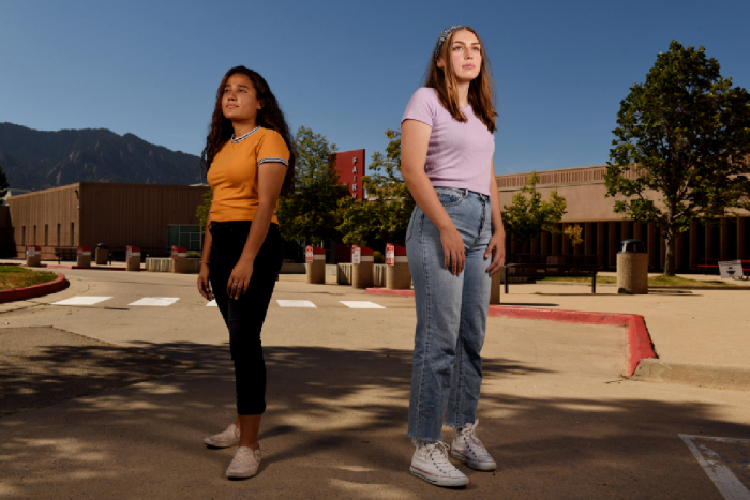
Beatriz Sanchez (left) and Sophie Dellinger (right) stand side by side, ready to help survivors of sexual assault with their new movement. photo courtesy of the Denver Post
Thomas Jefferson High School responds to the protests against sexual misconduct.
After East High School students were accused of rape and sexual assault on popular social media platforms like Instagram and Snapchat in late August and early September, social media blew up with further allegations. In response, more than 200 DPS students congregated on Friday, September 4th to protest against the district’s procedures when handling what they called ‘rape culture’ and to demand better education on the topic.
The following day, the Denver Public School District released a written statement to CBS4, remarking their awareness of the issue and their job as mandatory reporters. DPS not only wanted the public to know about their rigorous process to review the allegations, in which fairness is the primary objective, but also the resources and safety measures they provide for the students.
Although we still have no comments from the district about the ongoing investigation or planned changes besides another statement released on the official DPS page highlighting their support towards the students and staff of the district, as well as an invitation for the community to share their concerns, we do know that TJ is ready to implement new strategies.
“Try to remember, these stories are confidential,” suggested Maggie Kennedy, a counselor at TJ. “These are sensitive topics that should be addressed in the best way possible. Posting the name of victims and alleged perpetrators on social media may lead to bullying or harassment.”
Since years ago, TJ already implemented a Mental Health Referral Form, promoted the Safe2Tell line, and supplied a wide range of social workers, trusted adults, and psychologists. All of them are ready to address different issues with as much discretion as possible. However, they decided to offer more education about this specific subject. It all started with a small poll of the topics students wanted to learn the most about: consent, toxic masculinity, healthy relationships, sexual assault, human/minor trafficking, and resources for our friends and ourselves.
On the week of September 14th, TJ’s new advisement classes offered conferences with Derek McCoy, a representative of the organization Project PAVE. McCoy discussed topics including what role students play in rape culture, what ideas students have about sex and how they learned them, the definition of consent and coercion, students’ comfort with their romantic partner, and the importance of the language used to refer to intimacy, attraction, and sexuality.
“It created awareness,” said Andrea Berenice, a senior at TJ. “Students can start to be more open to the topic and create a ‘trust circle’ from which to get the correct information and ask questions without fear to be judged.”
On the week of September 21st, TJ students had speakers such as Becca Tiell, a member of UC Denver’s END Violence project team who provides individual therapy, group advocacy, and education, especially for victims/survivors. Megan Healy, a health educator at the Denver Health clinic inside TJ, discussed all topics around sexual health, healthy relationships, consent, and communication. Danielle Robinson, from the Denver District Attorney Office, serves as TJ’s Sexual Assault specialist and works closely with the Denver Police Department Sex Crimes Unit. “These are just the start,” Kennedy proclaimed. “We are not done, and as McCoy said, ‘We did not create the cultures we were born into, but we are responsible for transforming them for better.’”
Resources: